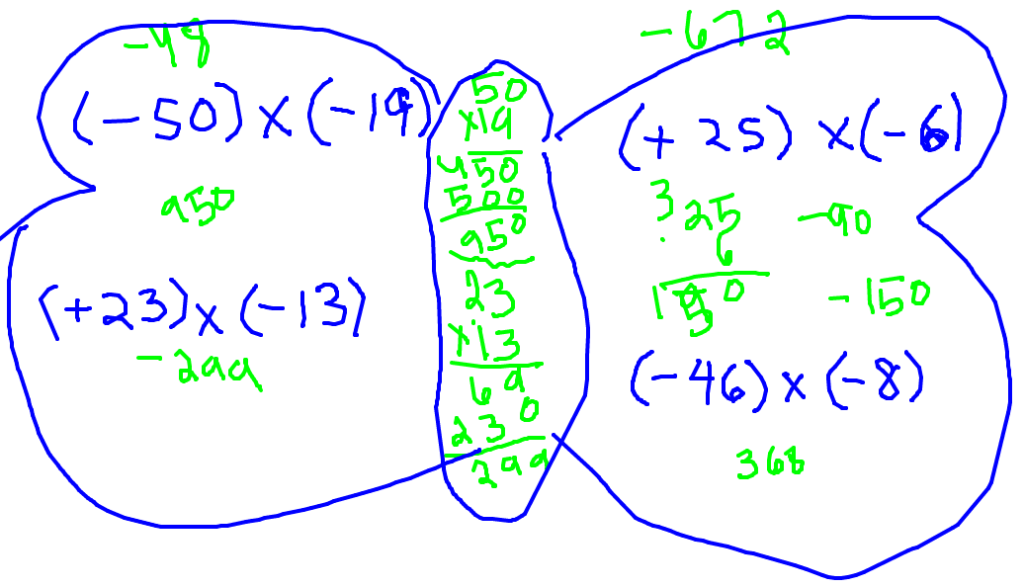Topic: motivation
What changes when someone believes in you?
Sunday, January 21st, 2018(Here’s a “math butterfly” one of my students and I created during a recent tutoring session!)
What changes when someone believes in you?
I’ve been thinking about this a lot lately.
I just had a huge performance breakthrough on my cello with my acting coach, and I’m getting ready for my quarterly business retreat with my business mentor. I’m going to be spending over a week surrounded by people who love me and believe in my highest potential and biggest vision.
In both of these situations, I feel so safe and accepted to really go for it, and I cannot believe how much better my music and my business and teaching gets as a result.
It completely changes my concept of what I’m capable of. It makes me believe that my dreams really can come true, because I can see it already happening.
Let me tell you, though, it hasn’t always been like this! At ALL.
Just as an example, not so long ago, when I was in graduate school for cello performance, I went to audition for two different summer chamber music festivals.
At the first audition, the person I was auditioning for radiated skepticism about me and my abilities. I didn’t feel very comfortable – I could tell she thought I had something to prove. She asked pointedly, “Do you have anything fast you could play for me?” I don’t even remember how I responded to that, but I remember thinking that if she accepted me into her festival, she would think she was doing me a favor, and I would feel seriously inferior.
The very next day, I went to audition for an amazing violinist, and took the commuter rail all the way out to New Jersey to meet her at the festival location. Her demeanor was so warm and welcoming and enthusiastic. I felt so comfortable!
I had fun playing for her, and when I was finished, she said very firmly, “You DEFINITELY have what it takes to be accepted to this festival!”
So guess which festival I ended up attending?
Yes, the one with the enthusiastic and welcoming teacher!
This experience was a real turning point for me. At this festival, I played the Cello 2 part in the Mendelssohn String Octet, which is both one of my most favorite-est pieces of music in the WORLD, and has an unbelievably hairy and notorious cello solo at the beginning of the last movement – that I had to learn!
This amazing violinist teacher went completely out of her way to set me up to really rock it. She even demonstrated how to play this solo holding a GRAPEFRUIT instead of using her fingers! And her musical partner and husband, also an incredible teacher, gave me a great fingering. I learned how to do it!
When we performed, I just went for it. And the audience response was so phenomenal. We were playing in a church, and the audience members stood up and BANGED on the pews, they were so excited! We were riveting!
This experience gave me the rock-solid conviction that classical music can be just as electrifying as anything else – and can truly bring an audience to its feet with RAUCOUS joy, not just polite or intellectual appreciation!
Looking back on this experience, it is so funny to me that that first person I auditioned for was skeptical that I could play fast. Because the second person, the amazing violinist, trusted me and helped me learn a SUPER FAST cello solo that I completely rocked (if I do say so myself)!
So what changes when someone believes in you?
I think it’s really simple.
1. When someone believes in you, they automatically ask you to do more.
2. Ideally, they also give you the TOOLS to actually DO it.
3. You have the opportunity and the tools to go beyond what you thought you were capable of.
4. You experience mastery! Breakthroughs happen! People respond with incredible enthusiasm! You are so excited and happy!
5. You believe in yourself, and you keep going. You begin to inhabit a COMPLETELY DIFFERENT REALITY.
Amazing, right? But – let’s look at the shadow side.
What happens when the teacher or mentor you trust DOESN’T believe in you?
1. They don’t trust you, so they don’t ask you to do more.
2. They usually don’t give you the tools to do more because they actually don’t know how to really help you, or they don’t even think you would “get it.” (A lot of times this is subconscious or unconscious on the teacher’s part, I’ve found.)
3. You don’t go beyond what you thought you were capable of. Your idea of what you can do starts to shrink.
4. Super important: you subconsciously pick up that they don’t believe in you and you start to entrain with that. You start to believe in yourself less, and you don’t do as well.
5. Or you start pouring an enormous amount of mental, emotional, and spiritual energy into defending yourself in your own mind. But inside you really just feel like you suck.
6. Downward spiral continues until you shift the pattern or reincarnate and start over!
Trust me, I know, because I’VE BEEN THERE! I have wasted so much time and energy with people who did not believe in me… constantly feeling insecure and defending myself in my mind. And I did not bloom. If I improved, it was so slow and painful. And I did not shine at my fullest light. This was not helpful for me or anyone else!
Two caveats:
1. Caveat #1: It doesn’t work if your teacher or mentor wants it for you more than you want it for yourself. You have to want it as much as your teacher or mentor, or even more.
2. Caveat #2: Don’t get me wrong. I know that there are times in life where we are going to encounter people who don’t believe in us. I’m not saying that we can only talk to or work with people who are constantly cheerleading us and telling us we’re awesome. (In fact, that’s not really what this awesome teacher did – she challenged me and gave me the tools I needed, which is so different from empty praise.)
But it IS up to us who we choose to study with and learn from. It IS up to us who we trust with our unfolding dreams. And it is so much more FUN and so much more POWERFUL and everything happens like a BAZILLION times FASTER when we choose to spend time with people who believe in us. It’s like the difference between picking crumbs off the floor of a MacDonalds and feasting on your favorite foods with people who love you!
If you or your kid is suffering in math right now because of a crisis of confidence – if you are feeling like your kid’s teacher doesn’t believe in them anymore, or you’re worried that your kid doesn’t believe in themselves, or that they feel deep down inside that “math doesn’t like me anymore” or “I’m not good at math” even though they’re busting their butt and trying their absolute best, I would love to talk to you.
Just click here to get started with your special application for my one-on-one math tutoring programs.
Once your application is received, and we’ll get you all set up with a super special complimentary appointment, just me and you, to get clear on what’s going on with your kid’s math learning and whether or not it would make sense for us to work together!
Comment on this post (2)














